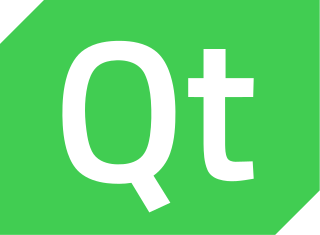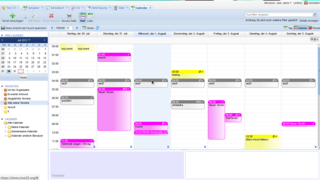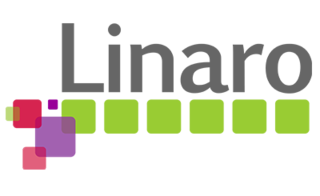
The OSGi Alliance is an open standards organization for computer software founded in March 1999. They originally specified and continue to maintain the OSGi standard. The OSGi specification describes a modular system and a service platform for the Java programming language that implements a complete and dynamic component model, something that does not exist in standalone Java/VM environments.

Qt is a cross-platform software for creating graphical user interfaces as well as cross-platform applications that run on various software and hardware platforms such as Linux, Windows, macOS, Android or embedded systems with little or no change in the underlying codebase while still being a native application with native capabilities and speed.

Telefónica, S.A. is a Spanish multinational telecommunications company headquartered in Madrid, Spain. It is one of the largest telephone operators and mobile network providers in the world. It provides fixed and mobile telephony, broadband, and subscription television, operating in Europe and the Americas.

Gruppo TIM, legally TIM S.p.A., also known as the TIM Group in English, is an Italian telecommunications company with headquarters in Rome, Milan, and Naples, which provides fixed telephony and DSL data services.
Content adaptation is the action of transforming content to adapt to device capabilities. Content adaptation is usually related to mobile devices, which require special handling because of their limited computational power, small screen size, and constrained keyboard functionality.

In the 1950s and 1960s, computer operating software and compilers were delivered as a part of hardware purchases without separate fees. At the time, source code, the human-readable form of software, was generally distributed with the software providing the ability to fix bugs or add new functions. Universities were early adopters of computing technology. Many of the modifications developed by universities were openly shared, in keeping with the academic principles of sharing knowledge, and organizations sprung up to facilitate sharing. As large-scale operating systems matured, fewer organizations allowed modifications to the operating software, and eventually such operating systems were closed to modification. However, utilities and other added-function applications are still shared and new organizations have been formed to promote the sharing of software.
Betavine was an open community and resource website, created and managed by Vodafone Group R&D, for the mobile development community in order to support and stimulate the development of new applications for mobile and Internet communications. The Betavine website allows developers to upload and profile their alpha-stage and beta-stage applications, provides interaction tools for members to share knowledge and give feedback on apps, and discuss topics in mobile. Betavine also contains a growing resources section with technical topics and APIs.
The Les Trophées du Libre contest was a free software contest whose goal was to promote innovative software projects by giving those projects recognition and media coverage as well as rewarding participating students and academic institutions with special prizes.

eyeOS is a web desktop following the cloud computing concept that seeks to enable collaboration and communication among users. It is mainly written in PHP, XML, and JavaScript. It is a private-cloud application platform with a web-based desktop interface. Commonly called a cloud desktop because of its unique user interface, eyeOS delivers a whole desktop from the cloud with file management, personal management information tools, collaborative tools and with the integration of the client’s applications.
Tuenti Technologies, S.L.U is a mobile virtual network operator (MVNO), that operates with the Tuenti brand, owned by Telefónica. It is a Spain-based tech company, that focuses on providing a cloud experience through its own application and its website to their customers.
MyMobileWeb is an open-source product that simplifies the development of adaptive mobile web applications and portals, providing an advanced content & application adaptation environment. It is based on open-standards, Java and Java EE technology.
The research project OSAMI-E is the Spanish subproject of the European ITEA 2 project OSAMI.

Open-source robotics (OSR) is where the physical artifacts of the subject are offered by the open design movement. This branch of robotics makes use of open-source hardware and free and open-source software providing blueprints, schematics, and source code. The term usually means that information about the hardware is easily discerned so that others can make it from standard commodity components and tools—coupling it closely to the maker movement and open science.

Tine 2.0 is an open-source business software package covering the software categories groupware and Customer Relationship Management (CRM), released under the terms of the agpl license.

Linaro is an engineering organization that works on free and open-source software such as the Linux kernel, the GNU Compiler Collection (GCC), power management, graphics and multimedia interfaces for the ARM family of instruction sets and implementations thereof as well as for the Heterogeneous System Architecture (HSA). The company provides a collaborative engineering forum for companies to share engineering resources and funding to solve common problems on ARM software.

Icinga is an open-source computer system and network monitoring application. It was originally created as a fork of the Nagios system monitoring application in 2009.

GNU Health is a free/libre health and hospital information system with strong focus on public health and social medicine. Its functionality includes management of electronic health records and laboratory information management system.
webinos is a computing platform for the development of software components that are independent of the utilized computer hardware or operating system. At the same time, webinos is the name of the EU-funded project aiming to deliver this platform. The webinos platform is based on open-source software. Its objective is to enable web applications and services to be used and shared consistently and securely over a broad spectrum of converged and connected devices, including mobile, PC, home media (TV) and in-car units. More than 5,400 developers have already downloaded the webinos operating system.

Nextcloud is a suite of client-server software for creating and using file hosting services. It is enterprise-ready with comprehensive support options. Being free and open-source software, anyone is allowed to install and operate it on their own private server devices.
The Telecom Infra Project (TIP) was formed in 2016 as an engineering-focused, collaborative methodology for building and deploying global telecom network infrastructure, with the goal of enabling global access for all.












